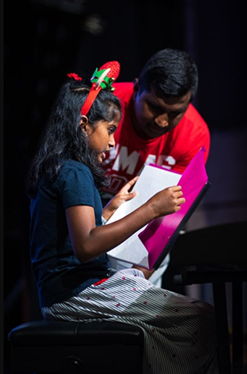.gif)
Overcoming Performance Anxiety: Strategies to Perform Confidently in Front of Others
Sunday, July 28, 2024 by Shaun Premnath | Uncategorized

Performance anxiety, which is sometimes called "degree terror," is something that a lot of players deal with. This feeling can show up as worry, nervousness, or fear before and during performances. This tension can make the show less enjoyable and change how the musician usually feels. It's important for artists who want to perform with confidence in front of other people to recognize and deal with performance anxiety.
Figuring Out the Signs
Performance nervousness can show up in many various modes, both physically and mentally. Some common physical signs are shaking, sweating, a fast heartbeat, and a dry mouth. On a psychological level, someone may feel extreme fear, self-doubt, or like they are about to fail. Being aware of these signs is the first thing that can help you deal with them better.
Why getting ready is important
To get over stage nervousness, you need to prepare. By practicing regularly and carefully, you can make sure that you remember the information and build muscle memory. This practice boosts confidence and lowers the chance of making mistakes, which can cause stress. It can also help to get used to the performance setting by mimicking performance conditions during practice.
How to Breathe to Feel Better
Deep and controlled respiratory is an effective device for dealing with performance tension. Slow, deep breaths can help in calming the frightened gadget and lowering anxiety ranges. Techniques consisting of diaphragmatic breathing, in which one breathes deeply into the abdomen in preference to the chest, maybe specifically powerful. Practicing these strategies frequently could make them an herbal reaction to tension.
Seeing yourself succeeding
Visualization is the process of practicing the performance in your mind in a good and thorough way. By picturing yourself doing well, your brain gets used to the idea of doing well, which lowers your fear and worry. To practice this method, find a quiet place, close your eyes, and picture the whole performance, from going on stage to the final bow.
Good Talk to Yourself
How someone talks to themselves can have a big effect on their performance nervousness. Positive self-speak method doing away with poor mind and doubts about yourself with high quality"I am well-prepared" and "I can do this" of terms that can help you feel greater assured and much less aggravated. Positive self-communicating can exchange the manner your mind works so you focus on fulfillment rather than failure.
Making a routine before a performance
Having a routine before a show can help you feel stable and in charge. Some things that can be part of this practice are light exercises, breathing exercises, and listening to relaxing music. Focusing on achievement instead of worry can help with a process that you know well.
Looking for Professional Help
Performance nervousness can be very bad at times and last a long time so that you may need professional help. Talking to a therapist or counsellor who focuses on performance tension will let you give you useful ways to cope with your problems. Cognitive-behavioral treatment (CBT) is one method that may assist in changing bad thought conduct and decreasing worry.
Accepting Your Mistakes
It can help to let go of the need to be perfect when you know that mistakes happen during live shows. No matter how experienced an artist is, they all make mistakes. If you see mistakes as chances to learn instead of failures, you can change your outlook and feel less anxious. Accepting mistakes can help you work with more ease and enjoyment

Putting together a support system
Having friends, family, and other artists who are there for you can make a big difference. Sharing stories and getting support can help you feel more confident. Also, playing in front of a supportive crowd can make it less scary and help you get over performance nervousness over time.
Frequently Presented Performance Chances
Having a lot of chances to perform can help reduce performance nervousness. Building confidence can be done by starting with smaller, less frightening places and working up to bigger ones over time. Each good act makes it easier to do well in front of other people.
What Mindfulness Can Do for You
Being mindful means specializing in and living inside the gift second. Mindfulness permits you to experience much less nerve-racking by means of taking your thoughts off of horrific thoughts and concerns about destiny. Meditation and careful breathing are two techniques that can be used every day to help you feel calm and focused.
Working and carrying on with a healthy life
Maintaining a wholesome way of life via regular bodily workouts, balanced vitamins, and good enough sleep can undoubtedly affect tension ranges. Exercise, in particular, can launch endorphins, which are herbal pressure relievers. A healthy frame helps a wholesome mind, making it easier to manipulate overall performance tension.
In conclusion
Overcoming performance anxiety is possible with the right strategies and mindset. Learn Music with Shaun offers practical tips and techniques to help musicians perform confidently. Recognize the signs of anxiety, prepare thoroughly, practice deep breathing, and use positive self-talk. Visualize success and develop a pre-performance routine. If needed, seek professional help and build a supportive network. Embrace mistakes as learning opportunities and increase performance opportunities gradually. Mindfulness and a healthy lifestyle also play crucial roles in managing anxiety. With these strategies, musicians can transform anxiety into confidence and enjoy performing.
